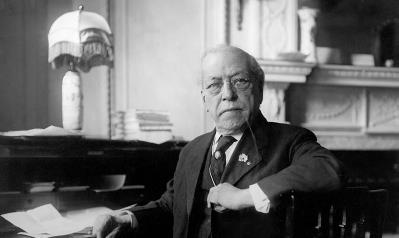The White Court (1910–21)Criminal Justice |
In what two decisions did the U.S. Supreme Court reverse the convictions of Samuel Gompers? |
The White Court twice reversed the criminal contempt convictions of Samuel Gompers, the first president of the American Federation of Labor (AFL) in Gompers v. Buck’s Stove & Range Company (1911) and Gompers v. United States (1914). Gompers declared a boycott of the Buck’s Stove & Range Company and published in his American Federationist newspaper unflattering things about the firm. For example, the newspaper listed the company on its “Unfair” and “We Don’t Patronize” lists.
Buck’s Stove responded by filing a lawsuit, alleging that Gompers and two other leaders of the AFL conspired to harm its business. A reviewing court granted an injunction, preventing Gompers from continuing these activities. The company then filed contempt proceedings, alleging that Gompers had violated the court’s order by continuing the labor protest activities. The court held Gompers in contempt and sentenced him to twelve months in prison.
The U.S. Supreme Court reversed Gompers’s conviction, reasoning that the contempt charges were criminal not civil and, thus, should have been initiated by the court, not the company. According to Justice Joseph Lamar, “This was a proceeding in equity for civil contempt, where the only remedial relief possible was a fine.” The Court dismissed the contempt conviction, saying that the Supreme Court of the District of Columbia had the right to institute criminal contempt proceedings if it wished.
The day after the U.S. Supreme Court decision, the district court formed a committee to determine whether the court should pursue criminal contempt charges. The court instituted such contempt charges and Gompers was again found guilty. This suit went to the U.S. Supreme Court and the Court in Gompers v. U.S. once again ruled in favor of Gompers, this time because the contempt charges were not filed within the statute of limitations. Justice Oliver Wendell Holmes wrote: “The power to punish for contempt must have some limit in time, and in defining that limit we should have regard to what has been the policy of the law from the foundation of the government. By analogy, if not by enactment, the limit is three years.”

